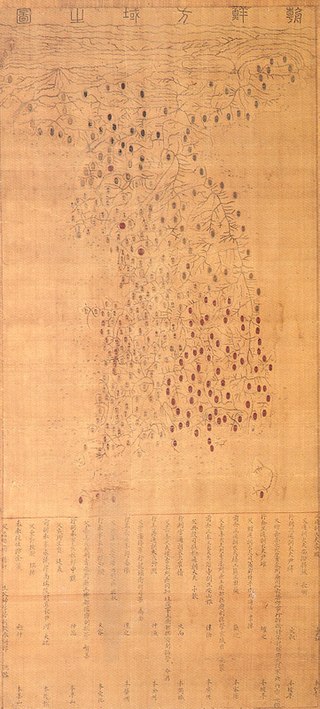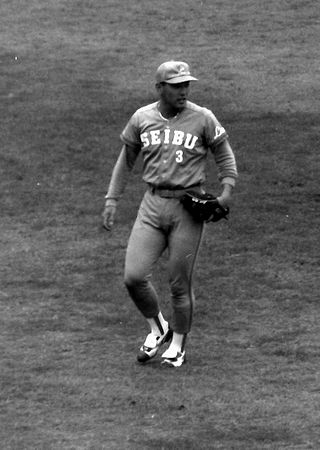
James Earl Carter Jr. is an American politician and humanitarian who served as the 39th president of the United States from 1977 to 1981. A member of the Democratic Party, he served as the 76th governor of Georgia from 1971 to 1975, and as a Georgia state senator from 1963 to 1967.

The history of South Korea begins with the Japanese surrender on 2 September 1945. At that time, South Korea and North Korea were divided, despite being the same people and on the same peninsula. In 1950, the Korean War broke out. North Korea overran South Korea until US-lead UN forces intervened. At the end of the war in 1953, the border between South and North remained largely similar. Tensions between the two sides continued. South Korea alternated between dictatorship and liberal democracy. It underwent substantial economic development.

The 1824 United States presidential election was the tenth quadrennial presidential election. It was held from Tuesday, October 26 to Thursday, December 2, 1824. Andrew Jackson, John Quincy Adams, Henry Clay and William Crawford were the primary contenders for the presidency. The result of the election was inconclusive, as no candidate won a majority of the electoral vote. In the election for vice president, John C. Calhoun was elected with a comfortable majority of the vote. Because none of the candidates for president garnered an electoral vote majority, the U.S. House of Representatives, under the provisions of the Twelfth Amendment, held a contingent election. On February 9, 1825, the House voted to elect John Quincy Adams as president.

The 1956 United States presidential election was the 43rd quadrennial presidential election. It was held on Tuesday, November 6, 1956. President Dwight D. Eisenhower successfully ran for reelection against Adlai Stevenson II, the former Illinois governor whom he had defeated four years earlier. This election saw the sixth and most recent rematch in presidential history, and the second where the winner was the same both times. This was the last election before the term limits established by the 22nd Amendment came into effect.

The president of the Republic of Korea, also known as the president of South Korea (Korean: 대통령), is the head of state and head of government of the Republic of Korea. The president leads the State Council, and is the chief of the executive branch of the national government as well as the commander-in-chief of the Republic of Korea Armed Forces.

First-past-the-post voting is an electoral system wherein voters cast a vote for a single candidate, and the candidate with the most votes wins the election. Analogous systems for multi-winner contests are known as plurality block voting or "block voting" systems; both FPTP and block voting are "plurality" systems in that the winner needs only a plurality of the votes and not an absolute majority. The term first-past-the-post is a metaphor from horse racing of the plurality-voted candidate winning such a race; the electoral system is formally called single-member plurality voting (SMP) when used in single-member districts, and informally called choose-one voting in contrast to ranked voting or score voting.
Elections in South Korea are held on a national level to select the President and the National Assembly. Local elections are held every four years to elect governors, metropolitan mayors, municipal mayors, and provincial and municipal legislatures.

Park Geun-hye is a South Korean politician who served as the 11th president of South Korea from 2013 to 2017, when she was impeached and convicted on related corruption charges.

The Fifth Republic of South Korea was the government of South Korea from March 1981 to December 1987.

Kazuhiro Kiyohara is a Japanese television personality, YouTuber and former professional baseball player. He played in Japan's Nippon Professional Baseball league for 23 seasons. He retired following the 2008 season.
The Korea Economic Daily (nicknamed Hankyung is a conservative and business daily newspaper in South Korea. It is the largest business newspaper by revenue in South Korea. It was founded on October 12, 1964, as the Daily Economic Newspaper and took its current name in 1980.
Presidential and vice- presidential elections were held in South Korea on 20 July 1948, following the Constitutional Assembly elections in May. The president was to be elected by the members of the National Assembly, as instructed by the 1948 Constitution. Of the 198 members of the National Assembly, 196 were present for the vote. A candidate required two-thirds of the votes cast to win. Syngman Rhee was elected with 180 votes, and took over the government to oversee the transfer of power from the United States Army Military Government in Korea.

Moon Jae-in is a South Korean former politician who served as the 12th president of South Korea from 2017 to 2022. Prior to his presidency, he served as Senior Secretary for Civil Affairs and Chief of Staff to President Roh Moo-hyun, Member of the National Assembly, and Leader of the Democratic Party of Korea.

Kim Young-sam, often referred to by his initials YS, was a South Korean politician and activist who served as the seventh president of South Korea from 1993 to 1998.

The 1912 United States presidential election in New Jersey took place on November 5, 1912. All contemporary 48 states were part of the 1912 United States presidential election. Voters chose 14 electors to the Electoral College, which selected the president and vice president.

The 6th local elections were held in South Korea on 4 June 2014.
Legislative elections in South Korea determine the composition of the National Assembly for the next four years.
Emotive Internet is a conceptualization of the Internet as an emergent emotional public space, such as how it serves as a space for the social sharing of emotions. It can also denote the quality of the Internet that allows it to be used to communicate in an emotive fashion or with emotional intent. Since it is an expressive medium, it also enables users to construct and represent their identities online. This is evident in the way emotional responses have been integrated in online communication and interactions.













